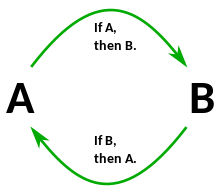Circular reasoning
The English used in this article or section may not be easy for everybody to understand. (April 2023) |
Circular reasoning (Latin: circulus in probando, "circle in proving";[1] also known as circular logic) is a logical fallacy. With this fallacy, the reasoner begins with what they are trying to end with.[2] Circular reasoning is not a formal logical fallacy, but a pragmatic defect in an argument. In this fallacy, the premises need to be proved the same way as the conclusion. In a normal argument, the premises do not need to be proved. Since the premises also need to be proved, the argument does not persuade. There is no reason to accept the premises unless a person already believes the conclusion, or that the premises provide no independent ground or evidence for the conclusion.[3] Circular reasoning is closely related to begging the question, and in modern usage the two generally refer to the same thing.[4]

Circular reasoning is often of the form: "A is true because B is true; B is true because A is true." Circularity can be difficult to detect if it involves a longer chain of propositions.
Examples
change- In the Bible, the Second Epistle to Timothy gives the example of using a citation of the New Testament to say that the Bible is the word of God. The problem is just that the New Testament is part of the Bible. In addition, this is just an argument from authority, since it is taken from one of the letters of the Apostle Paul. When Paul wrote the letter, there was no Biblical canon.
- Molière uses a doctor in one of his comedies, to make fun of this kind of argument. A father has a mute daughter. The father asks the doctor, why his daughter is mute. The doctor then tells him, that she is mute, because she lost the ability to speak. When the father asks, why she cannot speak, the doctor replies, that this is because she doesn't have control over her language.
References
change- ↑ Chisholm, Hugh, ed. (1911). . Encyclopædia Britannica. Vol. 6 (11th ed.). Cambridge University Press. p. 389.
- ↑ Dowden, Bradley (27 March 2003). "Fallacies". Internet Encyclopedia of Philosophy. Archived from the original on 9 October 2014. Retrieved April 5, 2012.
- ↑ Nolt, John Eric; Rohatyn, Dennis; Varzi, Achille (1998). Schaum's outline of theory and problems of logic. McGraw-Hill Professional. p. 205. ISBN 9780070466494.
- ↑ Walton, Douglas (2008). Informal Logic: A Pragmatic Approach. Cambridge University Press. ISBN 9780521886178.